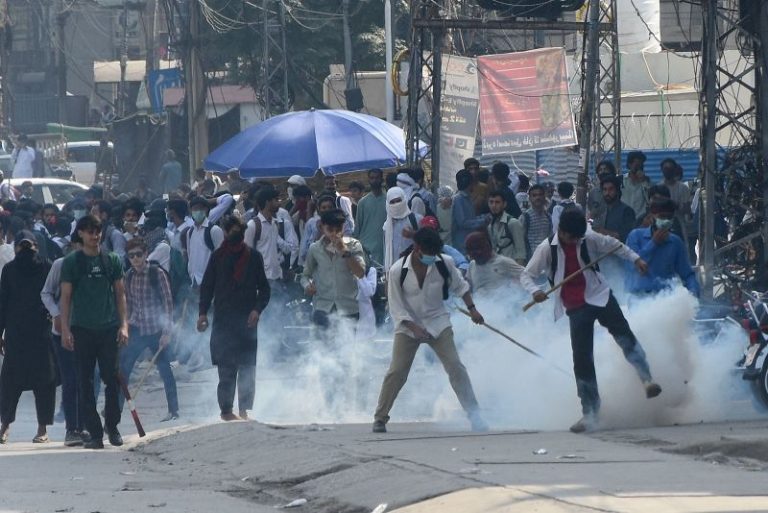Pakistani police fired tear gas and charged at student protesters who ransacked a college building Thursday, as anger spread over an alleged on-campus rape, prompting the government to shut schools, colleges and universities for two days.
Tensions have been high on college campuses since reports of the alleged rape in the eastern city of Lahore spread on social media, and protests have broken out in four cities.
Sexual violence against women is common in Pakistan, but it is underreported because of the stigma attached in the conservative country. Protests about the issue have been rare.
Thursday’s violence started when hundreds of students demonstrated outside a campus in the city of Rawalpindi in Punjab province. They burned furniture and blocked a key road, disrupting traffic, before ransacking a college building. Police responded by swinging batons and firing tear gas to disperse them, police official Mohammad Afzal said.
Police said they arrested 250 people, mostly students, on charges of disrupting the peace. News of the arrests panicked parents, who struggled to get their children released.
In Gujrat, also in Punjab province, a security guard died in clashes between student protesters and police on Wednesday. Police arrested a person in connection with the death.
They also arrested a man who is accused of spreading misinformation on social media about the alleged rape and inciting students to violence.
Earlier this week, more than two dozen college students were injured in clashes with police in Lahore after they rallied to demand justice for the alleged victim, who they said was raped on campus at the Punjab Group of Colleges.
On Thursday, the government banned rallies and shut educational institutions in Punjab for two days, apparently to prevent more protests, officials said.
The Federal Investigation Agency said it has registered cases against 36 people accused of spreading misinformation about the case on social media.
Authorities, including the province’s chief minister, said there was no assault, as did the woman’s parents. But Punjab police on Thursday urged people to share any information about the alleged rape.
Mauz Ullah, a student at the college where the woman was allegedly raped, said they were protesting to seek justice for her.
He said he did not believe the college or police “as they kept changing their position” on the alleged assault. He said the college initially denied any such incident took place. “If no such incident had taken place, then why did they arrest a guard?” he asked.
The protests appear to have begun spontaneously. Student unions have been banned in Pakistan since 1984.
On Thursday, Usman Ghani, the head of the youth wing of the Jamaat-e-Islami opposition party, demanded an end to the ban on student unions, saying they might have helped resolve the matter without violence.
He said cases of sexual abuse at educational institutions are common.
“But the main thing is how you respond to make sure that the attackers don’t get away without getting arrested,” he said.
Hasna Cheema, from the rights group Aurat Foundation, said neither Pakistani police nor the media were trained to handle such sensitive matters.
“They turn things from bad to worse instead of solving them,” Cheema said.
The Sustainable Social Development Organization said last month that there were 7,010 rape cases reported in Pakistan in 2023, almost 95% of them in Punjab.
“However, due to social stigmas in Pakistan that discourage women from getting help, there is a high chance that due to underreporting the actual number of cases may be even higher,” it said.
This week’s protests come less than a month after a woman said she was gang-raped while on duty during a polio vaccination drive in southern Sindh province.
Police arrested three men. Her husband threw her out of the house after the reported assault, saying she had tarnished the family name.


